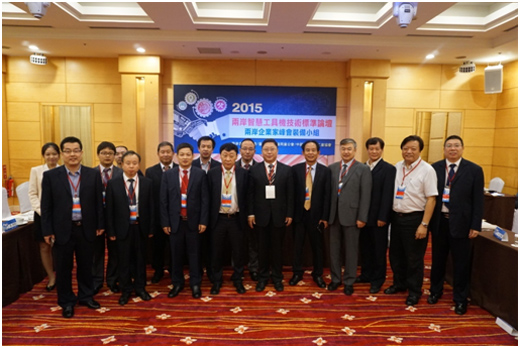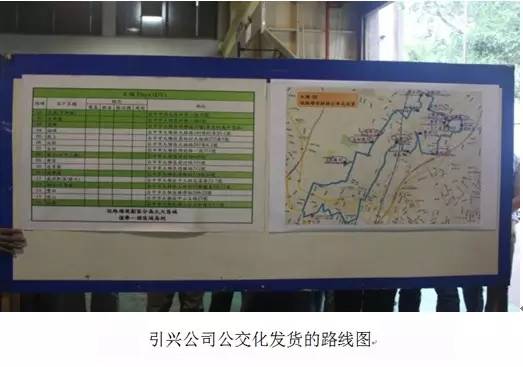Abstract [Background] On October 19-24, 2015, according to the annual key work arrangement of the Cross-Strait Entrepreneur Summit, Chen Huiren, executive vice president and secretary general of China Machine Tool Industry Association, led a delegation to Taiwan to conduct peer-to-peer exchange activities. During the trip, the delegation was at...
ã€background】 On October 19-24, 2015, according to the annual key work arrangement of the Cross-Strait Entrepreneur Summit, Chen Huiren, executive vice president and secretary general of China Machine Tool Industry Association, led a delegation to Taiwan to conduct peer-to-peer exchange activities.
During his stay in Taiwan, the delegation concentrated on the Precision Machinery Research and Development Center, Yongjin Machinery Industry Company, Suichang Electromechanical Company, Qinghong Electromechanical Industry Company, Taiwan Yinxing Co., Ltd. and Yintai Technology Co., Ltd. in Taichung. The main business involves application technology research, machining centers, electric machining machines, spindle motors, internal and external protection devices and rolling functional components. These six companies are typical representatives in the field in Taiwan or in the top three, and the types are more comprehensive: there are both production enterprises and scientific research institutions; in the enterprise, there are both host enterprises and The functional component supporting enterprise; in the host enterprise, there are both the gold cutting processing host enterprise and the electric processing host enterprise.
Therefore, this inspection activity is very helpful for understanding the overall situation of the Taiwan machine tool industry, and has thus formed a series of investigation reports to share with the industry.

Taiwan's machine tools first started in 1943, the establishment of the Yangtie plant, the original product of which was an ordinary lathe. Taichung Seiki was established in 1954. Most Taiwanese machine tool companies were established after the 1960s. At present, there are about 400 companies in Taiwan's machine tool industry, of which about 220 are metal cutting machine tools and about 50 are forming machine tools. The rest are mostly spare parts supporting enterprises. There are about 26,000 employees in total.
90% of Taiwan's machine tool industry is concentrated in Taichung, and the rest are mostly distributed in Taipei and Changhua. This large-scale machine tool industry is unique in the world. In the context of a high concentration, the Taiwan machine tool industry has produced a fine division of labor cooperation system. Within the 1-1.5-hour drive range of Taichung, almost all the matching parts can be purchased. It is very common for a host factory to have dozens of companies and hundreds of supporting companies. The parts factory also has several parts factories to support it. Especially for castings, only the two large enterprises, Yongjin and Taichung Seiki, have retained the foundry. Due to the centralized distribution of its supporting machine tool enterprises, the company that visited this tour was able to carry out bus delivery (see photo).

Taiwan's machine tool companies are private companies, and most are family businesses. In recent years, many companies have been operating the second generation of entrepreneurs. These private machine tool enterprises generally have a small scale, and more than 300 people are large enterprises. However, the property rights relationship is clear, the responsibilities are clear, the internal corporate governance structure is stable, the management is pragmatic, and the operation is efficient, thus showing strong market vitality and competitiveness.
Second, the technology research and development system of Taiwan's machine tool industry
The scale of Taiwan's machine tool enterprises is small, limited by the lack of funds and talents, and the research and development capabilities are generally poor. In the early stage of the development of the machine tool industry, due to the lack of high-quality functional components, the production cost is high, the quality of machine tools is difficult to guarantee, and the market competitiveness is relatively poor. The improvement in the level in recent years depends on the long-term efforts of the industry as a whole in technology research and development.
In order to promote the technological progress of the machine tool industry, Taiwan established the Metal Industry Development Center in 1963, the Metal Industry Research Institute in 1969, the Precision Machine Tool Center in 1977, and the Machinery Industry Research Institute in 1982, becoming the Industrial Technology Research Institute of Taiwan. One of the major professional research institutes specializing in the research and development of related technologies for machine tools and machinery automation.
The Institute of Machinery Industry of the Industrial Research Institute has more than 1,000 employees, and is an expert in all aspects of organic, electrical, liquid, gas and management. It has four functions: attacking, staffing, organization and service. The institute has a mechanical engineering advisory committee with foreign experts and a strategy committee composed of academics, industry and authorities in Taiwan. The research direction and major projects are closely integrated with the needs of Taiwan's machinery industry and the direction of technology development, and there are medium- and long-term overall development plans. 60% of the annual research projects are longitudinal research projects, which are funded by the authorities; 40% are horizontal projects that cooperate with enterprises, which are funded by enterprises and directly applied by factories after completion. The two well-known Taiwanese companies that produce rolling functional components and the joint manufacturing of gear grinding machines are incubating and developing based on the research results of the Industrial Technology Research Institute. The Qinghong Electromechanical Industry Company visited by the delegation also commissioned the ITRI to develop and design linear motors, and solved the key heating problems.
The Precision Machinery Research and Development Center visited in this study was established in 1993. The scale of the Precision Machinery Research and Development Center is smaller than that of the Institute of Machinery Industry of the Industrial Engineering Research Institute. The business direction is more focused on solving the recent new technology application and new product development problems in the machine tool industry (see “Series 2†for details).
In addition to the above two professional R&D institutions, the Taiwan machine tool industry has adopted a research and development alliance approach for more than a decade. A key technology or product between upstream and downstream enterprises or between similar enterprises, such as spindles and turn-milling machine tools, Formed a research and development alliance to jointly develop and share results.
The R&D system of Taiwan's machine tool industry has made good use of the integration advantages of government, enterprises and scientific research institutions. Enterprises are the mainstay of investment, closely surrounding market demand and industrial development, and scientific research institutions are closely integrated with enterprises, which are closer to the market and more efficient.
3. Competent authorities and industry organizations
The Industrial Bureau of the Ministry of Economic Affairs of Taiwan is the centralized management department of the machine tool industry. Since 1981, the Taiwan authorities have clearly defined the machine tool industry as a strategic industry and have always received the attention and support of the competent authorities. For example, establish R&D institutions and participate in their operations management, hire foreign experts, formulate financing methods, help machine tool companies to introduce foreign high-end equipment and open up overseas markets, promote advanced management methods in enterprises, set up honorary awards, and guide enterprises to improve management and product quality. ,and many more.
It is worth mentioning that the value-added tax rate of Taiwan's machine tool industry is 5%, and the tax burden is quite low. When entering the mainland market, they can enjoy the tax-free concessions of the ECFA agreement, which has formed a significant cost advantage for the mainland machine tool enterprises.
Taiwan's machine tool industry organization was established very early. The Taiwan Machinery Industry Association (TAMI) was established in 1945. During the visit, the delegation celebrated its 70th anniversary. The association is oriented to the entire machinery industry in Taiwan, but the machine tool industry is an important aspect (members account for about 40%). The general task of the Machinery Industry Association is to plan and organize the development of the machine tool industry and the entire machinery industry. The service of the guild is very market-oriented, and there are many outstanding cases in the development of the machine tool industry in Taiwan. For example, on behalf of industry funds, the establishment of the Precision Machinery Development Research Center to serve the technical research and product development of the whole industry; organize member fundraising, entrust the ITRI to develop gear machine tools, and so on.
In 2007, the Taiwan Machine Tool and Components Industry Association was established. It is a social organization specializing in the machine tool industry.
Fourth, the current market situation of Taiwan's machine tool industry
Taiwan's machine tool industry is marketing in markets around the world, and an obvious advantage is the ability to cushion the impact of local market downturns. But the mainland market, which accounts for one-third of its export share, has a big impact on Taiwan's machine tool industry.
In 2014, affected by the European debt crisis, the European and American markets have slowed down. However, due to the increase in mainland imports, Taiwan's machine tools still have considerable growth throughout the year: the annual production value is US$4.57 billion, up 7.8% year-on-year; the total export value is 37.5. Billion dollars, an increase of 5.8%. Among them, exports to the mainland were 1.21 billion US dollars, an increase of 7.3% year-on-year, accounting for 32.4% of total exports.
Since the decline of imported machine tools in the mainland this year, the impact on Taiwan's machine tool industry has been relatively large. From January to September this year, the total import of machine tools in the mainland decreased by 22.1% year-on-year, of which imports from Taiwan fell by 21.4%. According to the Taiwan Machinery Industry Association, the total export value of Taiwan's machine tools from January to July this year was US$1.915 billion, down 10.4% year-on-year. The guild analyzed that Taiwan's machine tool exports may fall 15-20% year-on-year this year.
This has a greater impact on Taiwanese companies with faster capacity expansion in recent years. For example, Intime Technology, which produces rolling functional components, has expanded rapidly in recent years, and its production and sales have dropped by about 50% from the peak. When introducing the situation to the delegation, the chairman of the company, Mr. Bai Yongyao, admitted that the company was already laying off employees.
Multi Slide Patio Doors,Sliding Folding Glass Door,Sliding Glass Door Wall,Multi Sliding Glass Doors
Leader Hardware Manufacturer Limited , https://www.leaderhardwarecn.com